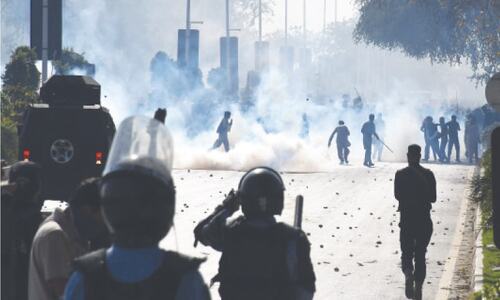RAWALPINDI: Pakistan is expected to face a shortage of 31 million acre feet of water by 2025, which will pose a grave threat to the economy, participants of the seminar were informed on Wednesday.
They emphasized the need for individual and collective efforts to conserve water. They said that the availability of water was not an issue in Pakistan, but integrated water management approaches to conserve water are needed to cope with water scarcity in the near future.
The seminar, held at the Pir Mehr Ali Shah Arid Agriculture University Rawalpindi (PMAS-AAUR) on World Water Day under the theme ‘Nature for Water’, was organised by the Faculty of Agriculture Engineering and the Rural Areas Water Association Pakistan (RAWAP).
Seminar on World Water Day focuses on individual, collective water conservation efforts
Pakistan Council of Research in Water Resources (PCRWR) Director Dr Manzoor Ahmad Malik was invited to the event as chief guest, while university vice chancellor Prof Dr Sarwat N. Mirza was the guest of honour.
Dr Malik said Pakistan depends on the Indus Basin Irrigation System, and 90pc of food production relies on water from this system.
He also suggested saving up to 25pc of water by reducing the growth of rice, saying: “Exporting rice means exporting water.”
Dr Malik suggested rainwater harvesting and high-efficiency irrigation systems for maximum growth and water storage.
Dr Mirza told participants that Pakistan was ranked 17th on the list of countries facing water crises.
He said that according to the Pakistan Water Partner, a total of 153m acre feet of surface water is available, while groundwater reserves are approximately 24m acre feet, of which a substantial part is pumped out.
“Pakistan is expected to face a shortage of 31m acre feet of water by 2025 which would pose a grave threat to Pakistan’s economy and according to the media, India has ventured upon an ambitious plan worth $120 billion to divert water of the Pakistani rivers,” he said.
He added: “Nature-based solutions have the potential to solve many of our water challenges. We need to do so much more with ‘green’ infrastructure and harmonise it with ‘grey’ infrastructure wherever possible by planting new forests, reconnecting rivers to floodplains, restoring wetlands for balancing water cycle for the improvement of human health and livelihoods.”
Dr Mirza suggested that the government begin constructing dams and provide secure water for irrigation and domestic use.
Agriculture Engineering professor Dr Jahanagir Khan Sial, Ministry of Planning Deputy Director (Water Resources) Fazal Akbar Afridi, Dr Amjad Nabi and RAWAP CEO Rehan Zeb also addressed participants, which included university deans and directors, faculty, administrative staff and students.
Published in Dawn, March 29th, 2018





























